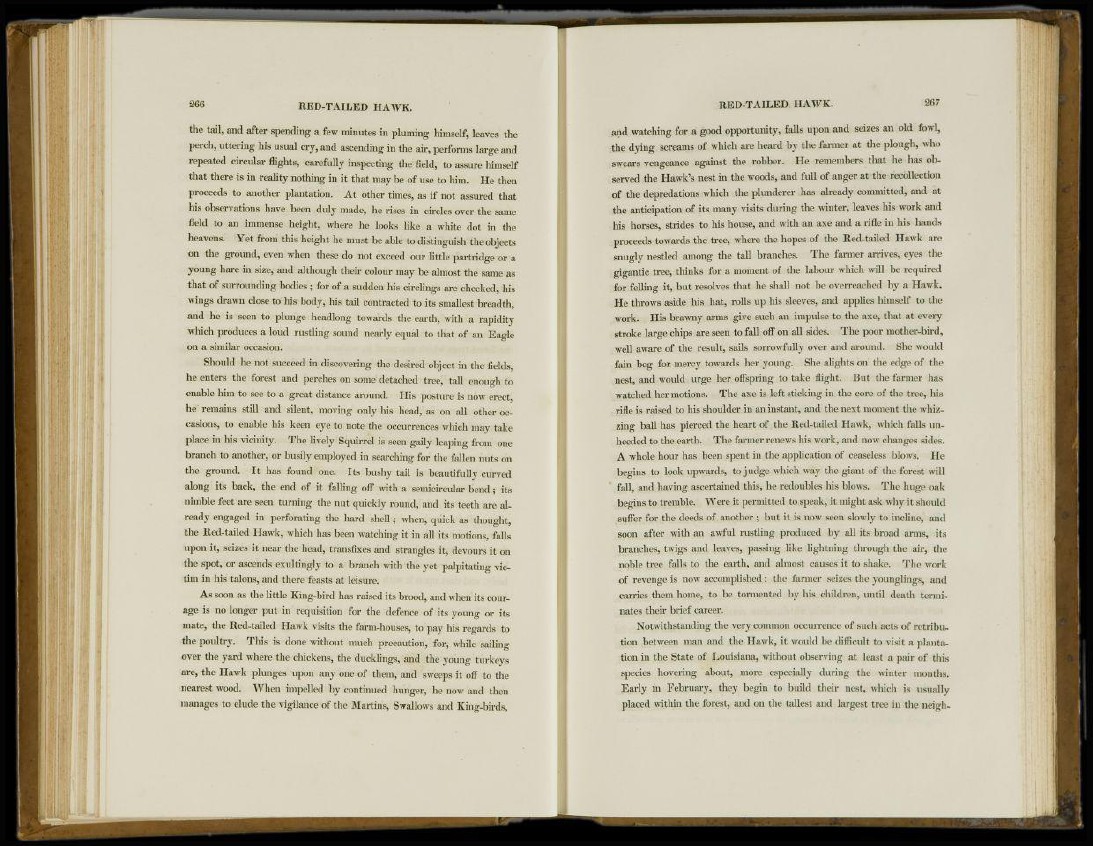
the tail, and after spending a few minutes in pluming himself, leaves the
perch, uttering his usual cry, and ascending in the air, performs large and
repeated circular nights, carefully inspecting the field, to assure himself
that there is in reality nothing in it that may be of use to him. He then
proceeds to another plantation. At other times, as if not assured that
his observations have been duly made, he rises in circles over the same
field to an immense height, where he looks like a white dot in the
heavens. Yet from this height he must be able to distinguish the objects
on the ground, even when these do not exceed our little partridge or a
young hare in size, and although their colour may be almost the same as
that of surrounding bodies ; for of a sudden his circlings are checked, his
wings drawn close to his body, his tail contracted to its smallest breadth,
and he is seen to plunge headlong towards the earth, with a rapidity
which produces a loutl rustling sound nearly equal to that of an Eagle
on a similar occasion.
Should he not succeed in discovering the desired object in the fields,
he enters the forest and perches on some detached tree, tall enough to
enable him to see to a great distance around. His posture is now erect,
he remains still and silent, moving only his head, as on all other occasions,
to enable his keen eye to note the occurrences which may take
place in his vicinity. The lively Squirrel is seen gaily leaping from one
branch to another, or busily employed in searching for the fallen nuts on
the ground. It has found one. Its bushy tail is beautifully curved
along its back, the end of it falling off with a semicircular bend; its
nimble feet are seen turning the nut quickly round, and its teeth are already
engaged in perforating the hard shell; when, quick as thought,
the Red-tailed Hawk, which has been watching it in all its motions, falls
upon it, seizes it near the head, transfixes and strangles it, devours it on
the spot, or ascends exultingly to a branch with the yet palpitating victim
in his talons, and there feasts at leisure.
As soon as the little King-bird has raised its brood, and when its courage
is no longer put in requisition for the defence of its young or its
mate, the Red-tailed Hawk visits the farm-houses, to pay his regards to
the poultry. This is done without much precaution, for, while sailing
over the yard where the chickens, the ducklings, and the young turkeys
are, the Hawk plunges upon any one of them, and sweeps it off to the
nearest wood. When impelled by continued hunger, he now and then
manages to elude the vigilance of the Martins, Swallows and King-birds,
and watching for a good opportunity, falls upon and seizes an old fowl,
the dying screams of winch are heard by the farmer at the plough, who
swears vengeance against the robber. He remembers that he has observed
the Hawk's nest in the woods, and full of anger at the recollection
of the depredations which the plunderer has already committed, and at
the anticipation of its many visits during the winter, leaves his work and
his horses, strides to his house, and with an axe and a rifle in his hands
proceeds towards the tree, where the hopes of the Red-tailed Hawk are
snugly nestled among the tall branches. The farmer arrives, eyes the
gigantic tree, thinks for a moment of the labour which will be required
for felling it, but resolves that he shall not be overreached by a Hawk.
He throws aside his hat, rolls up his sleeves, and applies himself to the
work. His brawny arms give such an impulse to the axe, that at every
stroke large chips are seen to fall off on all sides. The poor mother-bird,
well aware of the result, sails sorrowfully over and around. She would
fain beg for mercy towards her young. She alights on the edge of the
nest, and would urge her offspring to take flight. But the fanner has
watched her motions. The axe is left sticking in the core of the tree, his
rifle is raised to his shoulder in an instant, and the next moment the whizzing
ball has pierced the heart of the Red-tailed Hawk, which falls unheeded
to the earth. The farmer renews his work, and now changes sides.
A whole hour has been spent in the application of ceaseless blows. He
begins to look upwards, to judge which way the giant of the forest will
fall, and having ascertained this, he redoubles his blows. The huge oak
begins to tremble. Were it permitted to speak, it might ask why it should
suffer for the deeds of another ; but it is now seen slowly to incline, and
soon after with an awful rustling produced by all its broad arms, its
branches, twigs and leaves, passing like lightning through the air, the
noble tree falls to the earth, and almost causes it to shake. The work
of revenge is now accomplished : the farmer seizes the younglings, and
carries them home, to be tormented by his children, until death terminates
their brief career.
Notwithstanding the very common occurrence of such acts of retribution
between man and the Hawk, it would be difficult to visit a plantation
in the State of Louisiana, without observing at least a pair of this
species hovering about, more especially during the winter months.
Early in February, they begin to build their nest, which is usually
placed within the forest, and on the tallest and largest tree in the neigh